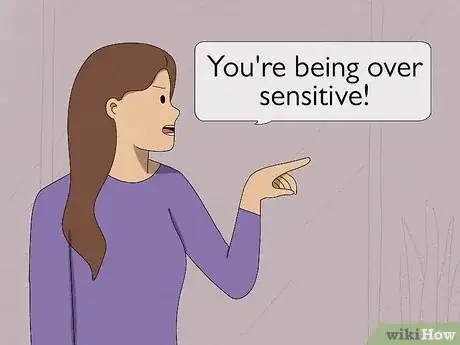This article was written by Jay Reid, LPCC. Jay Reid is a Licensed Professional Clinical Counselor (LPCC) in private practice in San Francisco, CA. He specializes in helping clients who have survived a narcissistic parent or partner. Treatment focuses upon helping clients identify and challenge self-diminishing beliefs as a result of narcissistic abuse. Jay holds a BA in Psychology from the University of Pennsylvania and an MS in Clinical Psychology from Penn State University.
There are 19 references cited in this article, which can be found at the bottom of the page.
This article has been viewed 2,982 times.
Female narcissists are often skilled at masking their narcissistic traits, so identifying them can be tricky. But there are some tell-tale clues to look for that reveal their true nature. Check out this list of 10 signs that she's a narcissist and see how many of them sound familiar. Then, keep reading to find out how to cope with the narcissistic woman in your life.
This article is based on an interview with our licensed professional clinical counselor, Jay Reid, LPCC. Check out the full interview here.
Things You Should Know
- A female narcissist exploits others to get what she wants. She relies on manipulative tactics like anger, criticism, and guilt to achieve her goals.
- She feels superior to other people, so she behaves in an entitled and demanding way.
- To neutralize a narcissistic power play, refuse to take the bait when she goads you. It takes the wind out of her sails when you ignore her comments or walk away.
- Setting boundaries is key to preserving your own mental health. If she ignores your boundaries, limiting or cutting off contact may be necessary.
Steps
Signs of a Narcissistic Woman
-
1She’s entitled and self-centered. She expects special treatment and can be extremely demanding. She feels she deserves to cut in front of people in line, that she’s owed an apology from a cashier, and that she’s entitled to the best table in a restaurant.[1] What she wants trumps everything else, and she’s very vocal about it.
-
2She gaslights people to make them doubt themselves. She twists the truth and claims things happened differently than they actually did.[2] If you ask pointed questions, she’ll change the subject or “flip the script” and interrogate you instead. When you try to express your feelings, she’ll accuse you of being oversensitive, or say that 'you’re' the one hurting 'her' feelings.
- Gaslighting refers to a form of abuse that makes the victim feel like they’re “crazy.” By confusing the victim and undermining their perception of reality, the abuser is able to gain power and maintain control.[3]
- For example, your narcissistic boss might lecture you for not finishing a report on time. When you remind her that she told you to wait until you received the stats for last quarter, she claims that never happened.
Advertisement -
3She craves attention and praise. She surrounds herself with people who admire her and inflate her sense of ego.[4] If she feels like she isn’t getting enough attention, she might start some drama with a snarky comment. She'll try anything to shift the focus back to her.[5]
- A female narcissist dislikes celebrations for other people because they hate having someone else be the center of attention. She may steal the show at her friend’s wedding by wearing an extremely glamorous dress–it might even be white![6]
-
4She won’t own up to her mistakes. Her sense of entitlement and need for control make her unlikely to admit being wrong. Instead, she rationalizes her behavior and shifts the blame so she seems like the victim in almost every situation. When things don’t go her way, she might respond with rage and accusations.[7]
- For instance, if your narcissistic friend borrowed one of your sweaters and shrunk it in the wash, she wouldn’t apologize and offer to replace it. Instead, she’d complain that it shrunk because it was cheap, and you should buy higher-quality clothing.
- It can be very frustrating to try to work out problems with a narcissist. She resists compromising, so any attempt to get on the same page can feel like hitting your head against the wall.
-
5She’s often moody and unpredictable. She can swing from being sweet and kind to you in public to raging at you as soon as you get in the car. It’s typical for a narcissist to put on a front when she has an audience, then treat the people in their inner circle terribly behind closed doors.[8]
- Say that you and your girlfriend are enjoying yourselves at a gathering with friends; she's in good spirits and is the life of the party. As soon as you get in the car, she turns on you, claiming you “ignored her all night” because you didn’t offer to refill her wine glass.
-
6She views other women as her competition. She wants to be the queen bee, and her sense of self-worth is tied to being “the best.” She feels good about herself–as long as she stays on top.[9] Her competitive streak extends to family relationships; she may see her sister or even her daughter as a threat to her dominance. She doesn’t want anyone to steal her spotlight![10]
- Although she’s unlikely to admit it, a female narcissist often feels jealous or envious of other women.[11] She hides this beneath a mask of self-confidence.
- For example, a narcissistic mom might feel envious if her daughter wins second place at a dance competition. She may say something like, "Being the second-place winner just makes you the first-place loser. I guess you didn't try hard enough."
-
7She’s obsessed with perfection. She's probably the sort of woman who won’t leave the house without freshly-applied makeup and a fashionable outfit. Even her “casual” look is carefully coordinated.[12] She focuses on the superficial: her social status and appearance are everything to her. This flawless facade feeds her need to feel superior to everyone else.
- Most female narcissists wouldn’t be caught dead looking frumpy. At the gym, her top coordinates perfectly with her yoga pants, and her expensive sneakers are spotlessly clean. She looks fresh and pretty with a shiny coat of lipgloss and her hair pulled up in a perky ponytail.
-
8She uses others to get what she wants. She’s very good at pretending to care about people, but in reality, she only cares about her own needs.[13] As long as you do exactly what she wants, she’s friendly. When you tell her no, her fake persona slips and her claws come out. Suddenly she’s a bully on a mission to criticize, mock, and humiliate you.
- She has no problem with using manipulative tactics to control others. She relies on anger, shame, criticism, and guilt to keep people in their place.
- If she realizes she can’t control someone, she dismisses and discards them. They’re no longer of use to her, so she finds a new person to be her “narcissistic supply.”
-
9She may rely on her sex appeal as a means of controlling others. A female narcissist might dress provocatively to draw people in.[14] She’ll then seduce them to achieve her selfish goals, whether that’s benefiting from social connections, scoring expensive gifts, or ensnaring a slavishly committed partner.
- She might post suggestive photos of herself on social media. She likes it when people slide into her DMs to compliment how she looks in that dress or bikini. If she thinks she can potentially get something out of that person, she will keep the conversation going.
-
10She overreacts to perceived criticism. On the surface, a narcissistic woman oozes superiority. However, at her core, there’s usually a deep-seated sense of insecurity that she’s unable to face. When she feels criticized, it touches a raw nerve, and her reaction is often overblown. Even constructive feedback can be viewed as a vicious attack on her character.
- When a narcissistic woman feels like someone is judging her, she may react with hostility, defensiveness, or rage.
- Say you have a narcissistic sister and she’s having trouble hitting the right chords while playing guitar. You might kindly offer to show her how to play the song. She instantly loses her temper: “I never said I was a professional! And it’s not like you’re a musical genius! Get out of here and quit picking on me!”
-
11She doesn’t think about how other people feel. Her lack of empathy causes her to respond coldly when someone needs support. If one of her friends is hurting, she might say something like, “That sounds like a “you” problem.” She’s simply unable to put herself in someone else’s shoes.
- You might be venting to a friend about an unexpected bill. Instead of expressing empathy and saying, “That sounds so stressful, I hope you’re able to resolve that soon,” she might say, “You don’t have savings? Sounds like you aren’t very responsible with your money.”
-
12She may not form lasting friendships or long partnerships. She doesn’t understand how to have healthy, reciprocal relationships. She uses her charm to draw people into her web and then tries to trap them there. The more they give, the more she takes, until the relationship completely disintegrates.[15]
- A female narcissist typically views her relationships as transactional. She’s looking to get something out of them: special favors, material gifts, or an extravagant romance where she’s treated like royalty.[16]
Dealing with a Female Narcissist
-
1Keep your expectations realistic so you aren’t disappointed. It’s normal to feel hopeful that you can change a narcissist. Could you fix the toxic dynamic if you just tried harder? Unfortunately, narcissistic women often lack the self-awareness to take accountability for their actions.[17] Realizing that you can’t change her might help you feel less burdened.
- Narcissistic women are more likely to participate in therapy than narcissistic men. It’s possible for them to develop new social skills if they put the work in. However, it’s often a challenge for them to stay in treatment.[18]
-
2Identify her tactics to avoid being manipulated. Learning more about narcissism will give you extra insight on how she operates. Watch out for two-faced behavior like catty remarks, overreacting to perceived slights, or blaming you for things outside of your control.[19]
- Since she feels driven to compete, she might make passive-aggressive comments about your clothing, your job, or your weight. Don’t take the bait; ignoring her comments will take the wind out of her sails.[20]
-
3Stay neutral and calm to diffuse the situation. It’s normal to instinctively react to someone’s behavior by treating them the same way they’re treating you.[21] Instead, try “grey rock method.” When she’s being mean, emotionally withdraw and make your face as blank as stone. Don’t react to her outburst. After a while, she’ll likely lose steam because you aren’t feeding her need for attention.[22]
- There’s a chance that the grey rock method may push a narcissist into a rage. If you’re concerned about the potential for violence, don’t use this method.
- If you’re experiencing abuse, the National Domestic Violence Hotline can help. In the US, call 1-800-799-7233, or text START to 88788.[23] If you need help right away, call emergency services.
-
4Set boundaries to protect yourself. A narcissistic woman will take as much as she can from those around her. Tell her which behaviors you refuse to tolerate, clearly and firmly. Let her know what the consequences are if she violates your boundaries.
- If you don’t want her to show up at your home uninvited, let her know it isn’t okay for her to just drop by. If she does, you won’t open the door. After a few attempts, she’ll realize that showing up uninvited is a waste of time.
- Even though it can be intimidating to enforce your boundaries, hold tight without budging. Boundaries don’t work if they’re only enforced occasionally.
-
5Assert yourself by minimizing contact. Everybody has limits, and honoring yours will help you feel more balanced and in control. If your relationship with a narcissistic woman is taking a toll on you, be selective about when, where, and how long you spend time with her.[24]
- One option to consider: only spend time with her while others are present. This can help diffuse the intensity of your dynamic, and a narcissist is more likely to play nice when she has an audience.
-
6Cut off contact if the relationship is too toxic. If you’ve set boundaries and she continues to ignore them, your relationship may have run its course. If it causes you stress and pain, is it worth holding onto? Although it can be a difficult decision, it might be time to consider whether cutting ties and walking away is in your best interest.
Warnings
- If you’re experiencing abuse, the National Domestic Violence Hotline can help. In the US, call 1-800-799-7233, or text START to 88788.[28] If you need help right away, call emergency services.⧼thumbs_response⧽
References
- ↑ https://youtu.be/cwuzgfFgLTM?t=148
- ↑ https://youtu.be/Ze6YB1gCDYQ?t=238
- ↑ https://www.asanet.org/wp-content/uploads/attach/journals/oct19asrfeature.pdf
- ↑ https://www.emotionalaffair.org/wp-content/uploads/2012/11/Female-narcissist.pdf
- ↑ https://youtu.be/cwuzgfFgLTM?t=172
- ↑ https://youtu.be/cwuzgfFgLTM?t=172
- ↑ https://psychcentral.com/disorders/narcissistic-personality-disorder/narcissist-plays-the-victim#entitlement
- ↑ https://scholarworks.smith.edu/cgi/viewcontent.cgi?article=1922&context=theses
- ↑ https://www.emotionalaffair.org/wp-content/uploads/2012/11/Female-narcissist.pdf
- ↑ https://psychcentral.com/pro/exhausted-woman/2015/07/the-difference-between-male-and-female-narcissists#2
- ↑ https://www.ncbi.nlm.nih.gov/pmc/articles/PMC6002876/
- ↑ https://www.emotionalaffair.org/wp-content/uploads/2012/11/Female-narcissist.pdf
- ↑ https://www.emotionalaffair.org/wp-content/uploads/2012/11/Female-narcissist.pdf
- ↑ https://psychcentral.com/pro/exhausted-woman/2015/07/the-difference-between-male-and-female-narcissists#1
- ↑ https://psychcentral.com/pro/exhausted-woman/2015/07/the-difference-between-male-and-female-narcissists#1
- ↑ https://www.psychologytoday.com/us/blog/toxic-relationships/201901/why-narcissists-play-games-your-heart
- ↑ https://youtu.be/uRMhS6oeehY?t=703
- ↑ https://psychcentral.com/disorders/narcissistic-personality-disorder/narcissist-plays-the-victim#how-to-protect-yourself
- ↑ https://www.psychologytoday.com/intl/articles/201107/how-spot-narcissist
- ↑ https://psychcentral.com/disorders/narcissistic-personality-disorder/narcissist-plays-the-victim#low-empathy
- ↑ https://psychcentral.com/disorders/narcissistic-personality-disorder/narcissist-plays-the-victim#low-empathy
- ↑ https://psychcentral.com/health/grey-rock-method#grey-rock-method
- ↑ https://www.thehotline.org/
- ↑ https://psychcentral.com/disorders/how-to-stop-contact-narcissistic-relatives#is-no-contact-the-best-option
- ↑ https://www.ncbi.nlm.nih.gov/books/NBK556001/
- ↑ https://www.ncbi.nlm.nih.gov/pmc/articles/PMC6002876/
- ↑ https://www.emotionalaffair.org/wp-content/uploads/2012/11/Female-narcissist.pdf
- ↑ https://www.thehotline.org/















































































Medical Disclaimer
The content of this article is not intended to be a substitute for professional medical advice, examination, diagnosis, or treatment. You should always contact your doctor or other qualified healthcare professional before starting, changing, or stopping any kind of health treatment.
Read More...